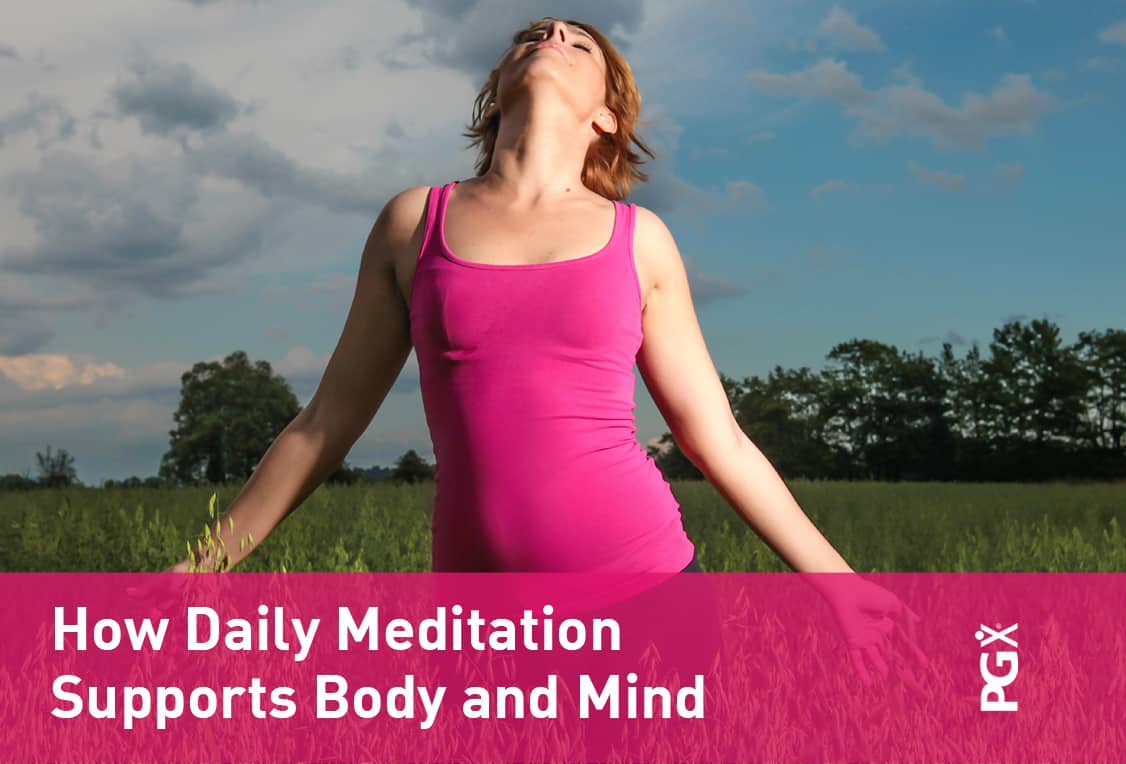How Daily Meditation Supports Body and Mind
For long-term practitioners of meditation, it’s pretty much a given that daily practice benefits both mind and body. Simply making time to meditate can significantly improve our ability to handle stress and cope with the pace of modern life.
Meditation is a great way to learn how to quiet anxious thoughts and create a sense of safety and empowerment that allow us to feel safe and positive when reflecting on past hurts. By practicing meditation regularly, we are better equipped to figure out how to move forward with peace and contentment. Experienced meditators have long recognized the practice of regular meditation as a great way to shield ourselves, to some extent, from the physiological impact of stress.
But how does meditation actually affect the body? Can learning to control our thoughts help to enhance our overall health?
The Benefits of Meditation
For many years the precise physiological effects of meditation have remained relatively elusive, largely because it’s difficult to monitor blood pressure, brain activity, and other factors without being obtrusive to the actual practice of meditation.
Now, thanks to new wireless technology, researchers in California have at last begun to describe the effects of meditation on mind and body, with the publication of a study in the “Journal Frontiers of Human Neuroscience” generating plenty of interest among long-term practitioners of the meditative arts.
The scientists behind this study devised discreet ways to detect the effects of meditation on the autonomic nervous system, the major mediator between mind and body. They recruited 20 experienced meditators, and 20 novices at a week-long wellness retreat and used non-invasive devices to collect data on heart-rate and brain activity during meditation and at rest.
Meditation and Cardiovascular Health
The majority of the volunteers in the California study had small, but significant decreases in blood pressure associated with meditation, despite most having normal baseline blood pressure. The effects of meditation on blood pressure were most pronounced in novices, with an average 3 mmHg decrease; experienced meditators had an average 2 mmHg decrease.
Earlier studies have also shown that practicing transcendental meditation regularly over the longer term can have significant benefits for maintaining healthy blood pressure already with the normal range (Brook et al., 2013), but this is the first time a study has successfully captured the immediate effects of meditation.
The Brain, Pain, and Meditation
The research in California also showed that even on their first day at the retreat novice meditators had significant changes in brain activity during meditation. Both novice and experienced meditators had significant changes in brainwave patterns, with the greatest effects seen in experienced meditators. Novice meditators had noticeable changes in brain activity between their first session at the retreat and their last session.
In one recent review, scientists concluded that meditation can help inhibit or relieve pain perception (Nakata et al., 2014). . Meditation is thought to modulate activity in areas of the brain associated with the perception of pain, including the anterior cingulate cortex, insula, secondary somatosensory cortex, and thalamus.
There is evidence of an association between long-term practice of meditation and anatomical changes in the brain that could influence the perception of pain.
Yoga’s Benefits for Mood Support
Meditation and yoga often go hand in hand, and scientists have recently reported significant psychological benefits of hot yoga (Bikram; a heated form of Hatha yoga). In this study, women who engaged in two 90 minute Bikram yoga sessions each week had greater decreases in anxiety and stress, scores compared to women assigned to a control group.
The California study involved 52 women, aged 25-42, who had slight elevations in anxiety, occasional depression, and high stress scores on a range of tests. None of the women had done any yoga or similar mind-body exercise over the 12 months prior to the study.
Interestingly, the most significant effects were seen in the 11 African American women in the study. Although the study group was small, this does suggest that yoga may be especially beneficial for African American women, where stress tend to be higher than in white women, and where access to and use of mental health resources is often poorer.
So, if you’re affected by stress and anxiety or are living with occasional pain, why not talk to your health care practitioner about the benefits of meditation and yoga?
References
Nakata, H., Sakamoto, K., Kakigi, R. (2014). Meditation reduces pain-related neural activity in the anterior cingulate cortex, insula, secondary somatosensory cortex, and thalamus. Front Psychol, Dec 16;5:1489.
Steinhubl, S. R., Wineinger, N. E., Patel, S., Boeldt, D. L., Mackellar, G., Porter, V., Redmond, J. T., Muse, E. D., Nicholson, L., Chopra, D., Topol, E. J. (2015). Cardiovascular and nervous system changes during meditation. Front Hum Neurosci. 2015 Mar 18;9:145.

